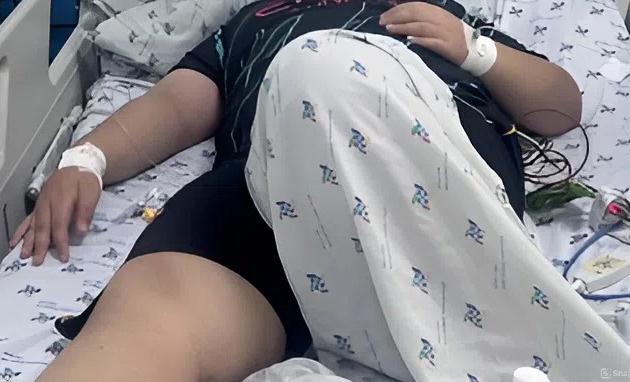On 6/7, Dr. Nguyen Minh Tien, Deputy Director of the Children's Hospital of Ho Chi Minh City, reported that dengue shock syndrome caused a series of complications for the obese boy, including blood clotting disorders, gastrointestinal bleeding, liver damage, and severe respiratory failure.
The medical team employed various treatments, including high molecular weight fluid transfusions, shock management, vasopressor medication, respiratory support with continuous positive airway pressure followed by non-invasive ventilation, blood and blood product transfusions, vitamin K1, and liver support therapy. After seven days of treatment, the boy recovered, breathing on his own and with normal liver and kidney function.
 |
The patient undergoing treatment at the hospital. Photo: Hospital provided |
The patient undergoing treatment at the hospital. Photo: Hospital provided
According to Dr. Tien, both international medical literature and clinical experience indicate that individuals who are overweight or obese, infants, those who experience shock early on days three or four, and those with severe hemoconcentration are at higher risk of developing severe dengue fever. Obese children are more likely to develop dengue shock syndrome than children of normal weight and have a poorer prognosis, necessitating early hospitalization. This group of children is prone to metabolic disorders, leading to several serious complications such as respiratory failure, coagulopathy, gastrointestinal bleeding, and liver and kidney damage. Furthermore, intravenous access is difficult in obese children, and other emergency and resuscitation techniques are also more challenging to perform.
"The period after the fever subsides, on days four and five, is the most dangerous phase of dengue fever," the doctor explained.
Parents should take their children to the doctor promptly for accurate diagnosis and a specific treatment plan. Hospitalization is crucial, even at night, if a child has a high fever for more than two days and exhibits any of the following signs: restlessness, tossing and turning, or lethargy and confusion; nosebleeds, bleeding gums, or vomiting blood or passing black stools; stomach pain or vomiting; cold hands and feet; lethargy, lying motionless without playing, or refusing to breastfeed or eat.
The dengue fever vaccine is now available in Vietnam for children aged 4 and above, as well as adults. Children should follow an age-appropriate diet, advised by a nutritionist, to avoid the risk of being overweight or obese.
Le Phuong












